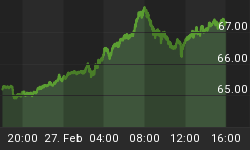Word on the street is that the Fed is now "out of bullets." Many economists fear that in its efforts to spur recovery, the Fed may have already exhausted its array of monetary ammunition and that it has nothing left of significance to fire at the steadily advancing recession. They believe that since interest rates are already near zero and Fed policies have failed to inspire banks to expand commercial and consumer lending (despite ample bank reserves), the tools traditionally employed by the Fed have been rendered impotent.
To their credit, these commentators are 100% correct in asserting that the Fed can't help the economy by printing more money. But it's not because the Fed policy is without consequence, but because the Fed has always been incapable of creating real growth. All it can do is manipulate the purchasing power of money. By keeping prices from falling more that they would have naturally, Fed intervention has created a burden. Lower prices would have cushioned the effects of the recession for many people.
However, because it failed to spark faster GDP growth, most people now agree that Fed's traditional ordnance, namely purchases of short-duration Treasuries from primary dealers in order to depress the yield curve, has lost effectiveness. But the Fed is never... ever... ever... out of ammo. In fact, according to Mr. Bernanke himself, the central bank may be about to unleash the heavy artillery.
Our central bank controls the printing press, so it has the ability to create money at will and use it to purchase anything it desires. It can and does purchase longer-dated Treasuries and other bank assets like home loans. If these funds are falling into the black hole of the banking system, there are ways for the Fed to cut out the middle man.
For instance, the Fed could buy stocks and real estate directly from the public. The Fed could buy a trillion-plus dollars worth of S&P 500 stocks. Consumers that sold stock to the Fed would receive funds that didn't previously exist. M1 money supply would boom as demand deposits surged. But if the Fed continued to hold interest rates to zero, banks would continue to pay near-zero interest on their deposits. So, American consumers would then be faced with a choice: earn pennies on their savings accounts or take the cash out and jump onboard the soaring stock market.
The Fed could also, if it thought necessary, create another bull market in real estate. It could guarantee 'no down payment' loans of any amount to any borrower, with a promise never to foreclose or seek compensation in the result of default. By making home purchases risk-free, such a policy would surely re-energize the housing sector.
By spurring price increases for stocks and real estate, the elusive "recovery" could be conjured in an instant. The only flaw would be that nothing would actually improve. By telegraphing unlimited monetary debasement, such policies would cause a run on the dollar. Although the "dreaded risk of deflation" would no longer be discussed, investors would be forced to once again abandon savings and chase runaway prices. In other words, we would find ourselves in the exact same predicament that led to the crash of 2008.
Speculation on non-traditional Fed activity is not a vain exercise. Bernanke's speech last week gave warning of major initiatives to come. First, there's this gem: "The FOMC will strongly resist deviations from price stability in the downward direction [i.e., deflation]." He also showed just how strongly he desires a return to rampant money supply growth and asset inflation when he said, "The Committee is prepared to provide additional monetary accommodation through unconventional measures if it proves necessary, especially if the outlook were to deteriorate significantly." What Bernanke means by such rhetoric is that the Fed will not only monetize assets held by banks, but will purchase assets directly from consumers - thereby placing money directly into their hands.
We must immediately understand that the Fed can shower liquidity directly on the consumer in any amount it wants. The political pressure to do so will only increase as unemployment rises and economic growth falters. Therefore, rather than fearing phantom deflation, investors should prepare their portfolios for the real upcoming battle with intractable inflation.
For in-depth analysis of this and other investment topics, subscribe to Euro Pacific's Global Investor Newsletter. Click here for your free subscription.
Click here to download Euro Pacific's Special Report: My Five Favorite Gold & Silver Mining Stocks.
Be sure to pick up a copy of Peter Schiff's just-released economic fable, How an Economy Grows and Why It Crashes.















